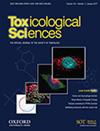The Blood-Testis barrier disruption is a prerequisite for Toxicant-Induced peritubular macrophage increases in the testis of peripubertal rats
IF 3.4
3区 医学
Q2 TOXICOLOGY
引用次数: 0
Abstract
Peritubular macrophages (PTMφ) are predominantly localized near spermatogonial stem cells in the testis. We previously revealed that exposure of peripubertal male Fischer rats to mono-(2-ethylhexyl) phthalate (MEHP) leads to increased PTMφs in the testis. The mechanisms that trigger increases in PTMφs in the testis are poorly understood. However, MEHP exposure is known to both induce spermatocyte apoptosis and to perturb the blood-testis barrier (BTB). This study aims to elucidate the association between the disruption of BTB and the increases of PTMφs in the testis by comparing the effects observed with MEHP to two other testicular toxicants with variable effects on the BTB and subtype of germ cell undergoing apoptosis. Methoxyacetic acid (MAA) acts directly on spermatocytes and does not affect BTB function, while cadmium chloride (CdCl2) induces profound injury to BTB. The results indicated that MAA exposure significantly increased spermatocyte apoptosis, while no significant changes in the numbers of PTMφs in the testis occurred. In contrast, CdCl2 exposure disrupted BTB function and increased the abundance of PTMφs in the testis. To further investigate whether MEHP-induced changes in BTB integrity accounted for the increase in PTMφs, a plasmid for LG3/4/5, the functional component of laminin-alpha 2, was overexpressed in the testis to stabilize BTB integrity before MEHP exposure. The results showed that LG3/4/5 overexpression substantially reduced the ability of MEHP to compromise BTB integrity and prevented the increase in PTMφ numbers after MEHP exposure. These results indicate that BTB disruption is necessary to increase PTMφs in the testis induced by toxicants.血液-睾丸屏障破坏是毒性诱导围青春期大鼠睾丸管周巨噬细胞增加的先决条件
管周巨噬细胞(PTMφ)主要分布在睾丸的精原干细胞附近。我们以前曾发现,围青春期雄性费舍尔大鼠暴露于邻苯二甲酸单(2-乙基己酯)(MEHP)会导致睾丸中的PTMφ增加。引发睾丸中 PTMφs 增加的机制尚不清楚。然而,已知暴露于MEHP会诱导精母细胞凋亡并扰乱血睾屏障(BTB)。本研究旨在通过比较MEHP与其他两种对睾丸血睾屏障和生殖细胞凋亡亚型具有不同影响的睾丸毒物的作用,阐明血睾屏障的破坏与睾丸中PTMφ的增加之间的联系。甲氧基乙酸(MAA)直接作用于精母细胞,不会影响BTB的功能,而氯化镉(CdCl2)则会对BTB造成严重损伤。结果表明,暴露于 MAA 会显著增加精母细胞的凋亡,而睾丸中 PTMφ 的数量没有发生显著变化。相反,CdCl2暴露破坏了BTB的功能,增加了睾丸中PTMφ的丰度。为了进一步研究MEHP诱导的BTB完整性变化是否是导致PTMφs增加的原因,在暴露于MEHP之前,在睾丸中过表达了LG3/4/5(层粘连蛋白-α2的功能成分)质粒,以稳定BTB的完整性。结果表明,LG3/4/5的过表达大大降低了MEHP破坏BTB完整性的能力,并防止了暴露于MEHP后PTMφ数量的增加。这些结果表明,BTB破坏是有毒物质诱导睾丸中PTMφ增加的必要条件。
本文章由计算机程序翻译,如有差异,请以英文原文为准。
求助全文
约1分钟内获得全文
求助全文
来源期刊

Toxicological Sciences
医学-毒理学
CiteScore
7.70
自引率
7.90%
发文量
118
审稿时长
1.5 months
期刊介绍:
The mission of Toxicological Sciences, the official journal of the Society of Toxicology, is to publish a broad spectrum of impactful research in the field of toxicology.
The primary focus of Toxicological Sciences is on original research articles. The journal also provides expert insight via contemporary and systematic reviews, as well as forum articles and editorial content that addresses important topics in the field.
The scope of Toxicological Sciences is focused on a broad spectrum of impactful toxicological research that will advance the multidisciplinary field of toxicology ranging from basic research to model development and application, and decision making. Submissions will include diverse technologies and approaches including, but not limited to: bioinformatics and computational biology, biochemistry, exposure science, histopathology, mass spectrometry, molecular biology, population-based sciences, tissue and cell-based systems, and whole-animal studies. Integrative approaches that combine realistic exposure scenarios with impactful analyses that move the field forward are encouraged.
 求助内容:
求助内容: 应助结果提醒方式:
应助结果提醒方式:


